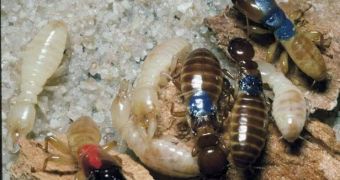Evolutionary biologists have for a long time wondered how is it that nature allows for the development of social insects, such as termites and ants. Mega-colonies can have up to millions of members that do not mate, reproduce, or start new colonies, the soldiers and common workers. Given that nature usually selects for those traits that promote reproductive success, how come it allowed these creatures to exist and endure? Even the man, Charles Darwin himself, posed this question more than 150 years ago.
In a new scientific investigation, carried out on termites, it was revealed that one of the factors that could explain this puzzle is the fact that the non-reproducing members of colonies tend to stay at home. “This question about the evolution of social behavior among insects really intrigued me,” explains Barbara Thorne, an evolutionary biologist at the University of Maryland, and the lead researcher on the study. She has spent the last three decades of her life investigating how natural selection allowed for social insects to endure, and even thrive.
“Social insects are extremely successful and dominant in many different habitats all over the world, yet we don't understand how this thriving but complex colony structure evolved. It's why I got involved in these studies when I was a young graduate student,” Thorne adds. “The incentive to remain home with their siblings and inherit their parents' estate could provide a missing link to the evolution of sterility among social insects," the expert reveals. In the new UM work, it is proposed that, early on in the insects' evolution, there was no incentive for youngsters to go out into the wild, and create new colonies, as the environment was very dangerous.
Therefore, the younger termites stayed at home with their parents, and took over when the elder died, or were killed off by neighboring termites, or other predators. It was also revealed that even sterile termites could reproduce when their parents are killed, which basically transforms them from creatures that are useless (in the evolutionary sense of the term) in the main progenitor of their generation.
“Ants, bees and wasps also have highly social colonies with queens and sterile helpers, but they have an unusual genetic system that complicates study of their social origins. Termites have both kings and queens and their colony organization is amazingly convergent with the ants, bees, and wasps, yet they evolved completely independently and have a more normal genetic system. Termites haven't received a lot of attention from evolutionary biologists, yet their case may reveal some fundamental principles,” Thorne concludes, quoted by LiveScience.

 14 DAY TRIAL //
14 DAY TRIAL //